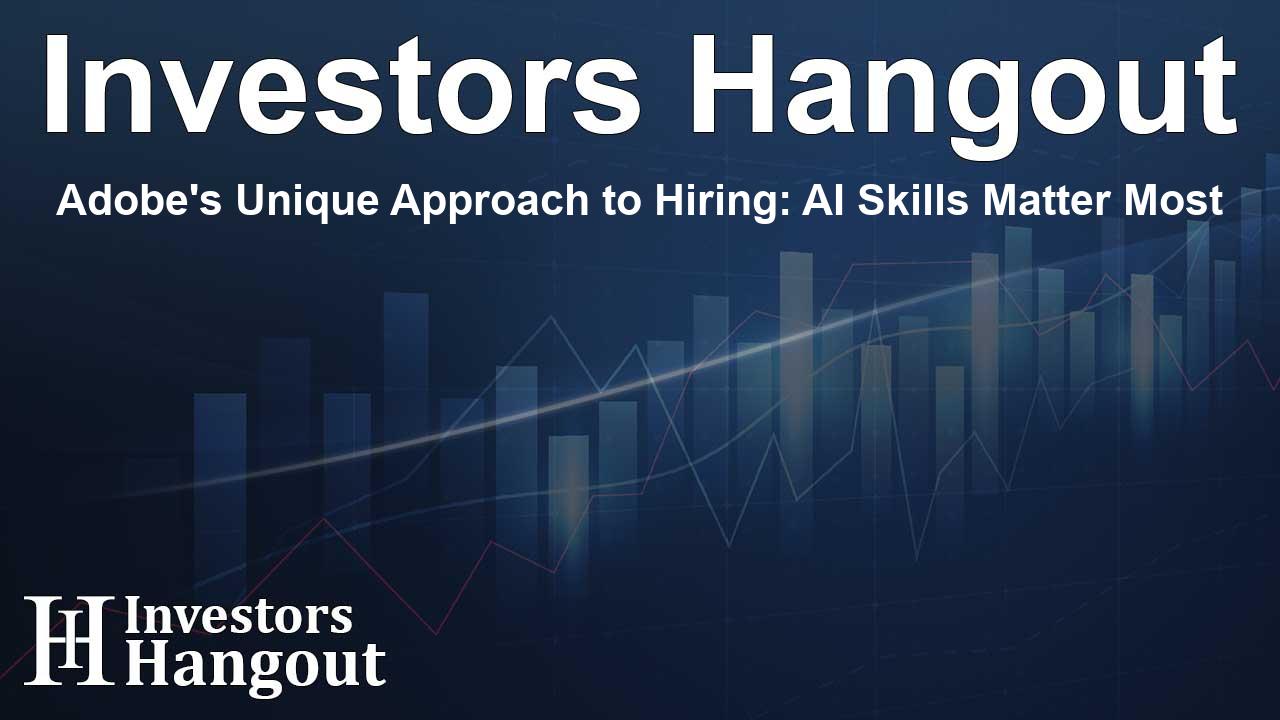Adobe's Unique Approach to Hiring: AI Skills Matter Most

Adobe Values AI Skills in Job Applications
Adobe Inc. (NASDAQ: ADBE) is making waves in recruitment by prioritizing candidates who exhibit creativity paired with artificial intelligence expertise. This shift illustrates how the $141 billion software giant evaluates potential employees in an evolving technological landscape.
Emphasizing AI in Candidate Evaluations
According to Adobe's Chief Communications Officer, Stacy Martinet, the ability to integrate AI into job applications significantly enhances a candidate's prospects. She emphasizes that applicants who creatively use AI tools to showcase their skills have a competitive advantage in this digital age.
AI as a Game Changer
Martinet stated, "As AI reshapes how we communicate, market, and create, those who combine creative capabilities with AI knowledge will stand out. We are actively seeking this unique blend in our future team members." This perspective underscores the belief that AI proficiency is essential in navigating modern job markets.
Innovative Interview Strategies
During the interview process, demonstrating one's AI skills through practical projects is highly encouraged. Martinet notes that if candidates present relevant projects, especially those that leverage AI, it impressively highlights their innovation and adaptability.
Practical Applications of AI
The value of showcasing AI in job applications is clear. Martinet explains, "If someone approached me saying they developed content for our social media using AI, I would be thrilled. This proactive attitude signals a readiness for the future of work at Adobe."
Adaptability to AI Post-Hire
While prior experience with AI tools is favorable, it's not a strict requirement. Martinet clarifies that while candidates may not have used AI before applying, they must embrace these tools once hired because AI is rapidly changing workflows and productivity.
"It’s not a hard ‘no’ for those unfamiliar with AI, but they need to be prepared to learn quickly. AI is becoming integral to our work processes, and adaptability is key to success at Adobe," she added.
The Broader Impact of AI on Hiring Trends
In recent developments, industry leaders like Goldman Sachs, SpaceX, and Stripe are also recognizing the transformative role of AI in shaping hiring practices and workforce dynamics. Goldman Sachs Group Inc. (NYSE: GS) CEO, David Solomon, noted that advancements in AI could lead to an expansion of workforce roles within the organization over the next decade.
Solomon's insights aim to quell concerns regarding AI-related job displacement, as he believes that technological investments will enhance employee productivity and result in the creation of more jobs in the future.
Concerns Over Entry-Level Job Opportunities
Meanwhile, at Stripe, the Head of AI, Emily Glassberg Sands, raised alarms about a potential mentorship gap stemming from hiring highly qualified Ph.D. graduates. She warned against the risk of losing entry-level learning opportunities, emphasizing the need for a nurturing environment for upcoming talent.
AI's Continued Evolution in the Workforce
Federal Reserve Chair Jerome Powell also cited that AI's influence is notably felt among new graduates entering the job market. However, the long-term impact remains to be fully understood.
This landscape indicates that AI-driven changes are not about replacing jobs but reshaping how companies approach hiring, training, and defining success in a technology-focused future.
As companies like SpaceX ramp up their AI recruitment efforts, it's evident that the demand for AI-savvy professionals is on the rise, and organizations are eager to explore the benefits that such skills bring to their operations.
Frequently Asked Questions
Why is Adobe prioritizing AI skills in job applications?
Adobe values AI skills as they believe that creativity combined with AI knowledge gives candidates a competitive edge in the modern job market.
What kind of projects can candidates present to showcase their AI skills?
Candidates can create projects utilizing AI tools, for example, developing content for social media or automating business processes, to demonstrate their capabilities during interviews.
Is prior experience with AI necessary for applicants?
No, prior experience with AI is not mandatory. However, candidates must be willing to learn and adapt to using AI tools once they are employed.
How are other companies adapting their hiring processes due to AI?
Companies like Goldman Sachs and Stripe are recognizing AI's potential to expand roles and are adjusting their hiring practices to include candidates with strong AI skills, while also cautioning about the loss of entry-level opportunities.
What is the future outlook for job roles in an AI-driven environment?
Industry leaders suggest that while AI may change the nature of many roles, it is also expected to create new job opportunities. Thus, adapting to AI could be crucial for future workforce development.
About The Author
Contact Olivia Taylor privately here. Or send an email with ATTN: Olivia Taylor as the subject to contact@investorshangout.com.
About Investors Hangout
Investors Hangout is a leading online stock forum for financial discussion and learning, offering a wide range of free tools and resources. It draws in traders of all levels, who exchange market knowledge, investigate trading tactics, and keep an eye on industry developments in real time. Featuring financial articles, stock message boards, quotes, charts, company profiles, and live news updates. Through cooperative learning and a wealth of informational resources, it helps users from novices creating their first portfolios to experts honing their techniques. Join Investors Hangout today: https://investorshangout.com/
The content of this article is based on factual, publicly available information and does not represent legal, financial, or investment advice. Investors Hangout does not offer financial advice, and the author is not a licensed financial advisor. Consult a qualified advisor before making any financial or investment decisions based on this article. This article should not be considered advice to purchase, sell, or hold any securities or other investments. If any of the material provided here is inaccurate, please contact us for corrections.
